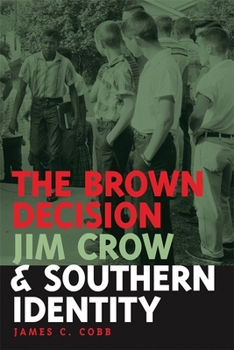The Brown Decision, Jim Crow, And Southern Identity
(Part of the Mercer University Lamar Memorial Lectures Series)
Select Format
Select Condition 
Book Overview
The 1954 Brown v. Board of Education ruling was a watershed event in the fight against racial segregation in the United States. The recent fiftieth anniversary of Brown prompted a surge of tributes: books, television and radio specials, conferences, and speeches. At the same time, says James C. Cobb, it revealed a growing trend of dismissiveness and negativity toward Brown and other accomplishments of the civil rights movement. Writing as both a lauded historian and a white southerner from the last generation to grow up under southern apartheid, Cobb responds to what he sees as distortions of Brown's legacy and their implied disservice to those whom it inspired and empowered.
Cobb begins by looking at how our historical understanding of segregation has evolved since the Brown decision. In particular, he targets the tenacious misconception that racial discrimination was at odds with economic modernization--and so would have faded out, on its own, under market pressures. He then looks at the argument that Brown energized white resistance more than it fomented civil rights progress. This position overstates the pace and extent of racial change in the South prior to Brown, Cobb says, while it understates Brown's role in catalyzing and legitimizing subsequent black protest. Finally, Cobb suggests that the Brown decree and the civil rights movement accomplished not only more than certain critics have acknowledged but also more than the hard statistics of black progress can reveal. The destruction of Jim Crow, with its "denial of belonging," allowed African Americans to embrace their identity as southerners in ways that freed them to explore links between their southernness and their blackness. This is an important and timely reminder of "what the Brown court and the activists who took the spirit of its ruling into the streets were up against, both historically and contemporaneously."Format:Hardcover
Language:English
ISBN:0820324981
ISBN13:9780820324982
Release Date:October 2005
Publisher:University of Georgia Press
Length:102 Pages
Weight:0.60 lbs.
Dimensions:0.6" x 6.0" x 8.5"
Customer Reviews
1 rating
Packs a wallop
Published by Thriftbooks.com User , 19 years ago
The fiftieth anniversary of Brown v. Board of Education in 2004 brought forth a plethora of related media. In addition to the tributes, there were also dismissive and negative revisionist histories claiming, for example, that Brown had no impact at all, or worse, that it actually interrupted and delayed the inevitable process of desegregation already unfolding in the South following WWII. James C. Cobb (Spalding Distinguished Professor of History at the University of Georgia) responds to what he sees as distortions of Brown's legacy with scholarly guns a'blazing in this series of lectures presented for the Mercer University Lamar Memorial Lectures . In the first chapter, he makes quick work of the revisionists' claims that Jim Crow teetered on the brink of collapse by 1954. The second chapter challenges writers who claim that Brown's contribution to civil rights progress was ultimately less significant than its role in energizing white resistance to it. The final chapter argues that Brown and the ensuing civil rights movement accomplished more than its critics acknowledge, not insignificantly by allowing blacks the opportunity to embrace their identity as southerners. He examines the current trend of black migration to the south, as well as the trend to self-segregate not merely by race, but economic class. His writing is clear, concise and engaging, his research rock solid and his attitude unabashedly liberal. I appreciated the inclusion of his personal observations as a white Southerner growing up under Jim Crow. And he doesn't mince words; in the final chapter he notes that dismay with the civil rights movement could be due in part to expectations. He writes "Many black and white liberals assumed that removing racial constraints on opportunity would somehow produce an unending stream of Alice Walkers but never a Condoleezza Rice." (Or, for that matter, a Clarence Thomas.) This slim volume packs a wallop, and is must reading for anyone interested in Brown in particular, or Jim Crow in general.





